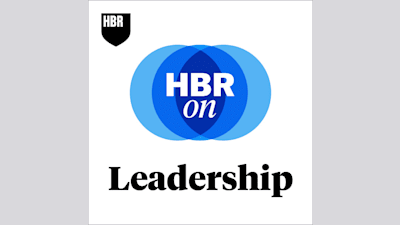
on
*sdílené články jsou řazeny od těch podle mě nejlepších po dobré

on

on newsletter.eng-leadership.com
Ownership doesn’t happen by chance → it’s built through deliberate actions that leaders often overlook!

on hbr.org
Confronting direct reports about performance issues can feel overwhelming, especially for first-time managers, who may worry that sharing critical feedback could damage their relationship with the employee. But performance conversations, especially where you need to give critical feedback, don’t have to be scary. There are a few common mistakes to avoid when giving critical feedback. Being a great people manager is not about being a friend or being liked by everyone all the time — it’s about being a manager who cares about their employees and helps them get their job done.

on www.izatlouk.cz
Nabízím zkratku k tomu podstatnému ze tří rozhovorů, které mapují potřeby v různých fázích života vývojářů. 🚀O juniorech s Honzou Javorkem. 🧑🎓Jak se z vývojáře stát manažerem s Honzou Mísařem a Davidem Bilíkem. 🧐O těch, kdo se do manažerských rolí nehrnou s Rikim Fridrichem a Alešem Roubíčkem.

on open.spotify.com
Holding in anxiety, anger, or despair for the sake of appearing professional can feel impossible. When the emotions are just too much—your boss’s dismissive tone infuriates you, a direct report unloads, you can’t hold back tears in a meeting, a tragedy happens, and you’re leading an all-staff tomorrow morning—what do you do? Mollie West Duffy talks about the good that can come from being vulnerable with colleagues, and then Liz Fosslien returns to help us reassess where the line between vulnerability and oversharing is today.

on peterszasz.com
Breaking down the feedback cycle process from preparation to follow-up. Approaches I found useful, antipatterns to avoid, and a document structure that can help bring it all to one place. I hope to turn this often-dreaded task into a powerful tool for individual growth and organizational success.

on hbr.org
In recent years, leading executives from firms like Google, Bridgewater, and Netflix have touted the advantages of a work environment marked by candid feedback. Employees seem to have bought into the benefits, too. In a 2019 survey, 94% said corrective feedback improved their performance when presented well. Unfortunately, the increased diversity of our workplaces has made it much more likely that feedback will not go over well and will be misinterpreted as an act of hostility. This article explains how to navigate the divides.

on hbr.org
When we ask for feedback on our work, we often get poor-quality feedback that is not useful or makes us feel attacked or defensive. Part of the reason is that we’re asking for feedback. Most requests are too generic, too open, and too late. This article discusses a three-step process for getting more constructive feedback that supports our growth, strengthens our relationships, and accelerates our careers.

on hbr.org
Approaching a conversation about improving an employee’s performance requires preparation, empathy, and a focus on collaboration. Even though hearing the truth about their current performance will be tough and potentially hurtful, it’s a teaching moment managers must embrace to help them become more resilient and adept at problem-solving and developing professional relationships. The author offers several strategies for treating difficult performance conversations not as fault-finding missions but instead as opportunities to work collaboratively to define a shared commitment to growth and development.

on hbr.org
Managers often have preconceived notions that can act as a barrier to giving timely, helpful, and honest performance feedback. Three of the most common preconceived notions are: 1) the feedback conversation is going to be long and drawn out; 2) the feedback needs to be perfect; and 3) the feedback might be taken the wrong way. It’s understandable that you don’t want to upset your direct reports. Nevertheless, other people’s reactions and responses to feedback are largely out of your control. What is not is being clear about what you’re observing and requesting, naming the impact, focusing on strengths, developing actionable next steps, and delivering the feedback with care and curiosity.

on hbr.org
Dealing with employees' negative emotions isn’t easy, but knowing what to do or say can make a huge difference to their well-being, the quality of your relationships with them, and team performance. The trouble is that many leaders fail to respond at all because they think discussing emotions at work is unprofessional or worry they don’t have the right to intervene in personal matters. That’s a mistake. Research shows that teams whose leaders acknowledge members’ emotions perform significantly better than teams whose leaders don’t.

on hbr.org
Leaders can’t rely on organizational mission statements to inspire employees. They have to help their people find inner purpose. One way is through action identification theory, which explores the levels of meaning attached to any task. Another is through regular check-ins that help employees think about what they’re good at, what they enjoy, what makes them feel useful, what propels them forward, and how they relate to others.

on hbr.org
We’re all looking for purpose. Most of us feel that we’ve never found it, we’ve lost it, or in some way we’re falling short. But in the midst of all this angst, we’re also suffering from fundamental misconceptions about purpose. The first misconception is that purpose is a thing you find. The purpose is a thing you build, not a thing you find. And most of us will have multiple sources of purpose in our lives — in our work, family, or community, for instance. Just as we all find meaning in multiple places, the sources of that meaning can and do change over time.

on zaidesanton.substack.com
Being a manager is not for everyone, and it shouldn’t be. Stop and consider your options if you were pushed into the role and suffered through it every day. But for some of us, it passes. The lows become manageable, and the highs no longer sweep you off your feet. We are a very adjustable species.

on hbr.org
Connection in the workplace is commonly thought of as a single dimension that prioritizes interpersonal relationships with co-workers. However, in a recent research collaboration, the research team at the NeuroLeadership Institute (NLI), along with technology firm Akamai, identified that connection in the workplace is, in fact, made up of four interrelated and essential elements: employee connections with their colleagues, leader, employer, and role. This more accurate and nuanced view of workplace connections has implications for how organizations can design intentional talent strategies to create workplaces where employees are committed, engaged, and performing.

on hbr.org
Numerous studies show that close to two-thirds of U.S. employees are bored, detached, or jaded and ready to sabotage plans, projects, and other people. Why so much unhappiness among professionals who have the capacity to shape their work lives? The author highlights three of the most common reasons—ambition, doing what’s expected of us, and overwork—which seem productive on the surface but are harmful when taken to the extreme. To break free of these “happiness traps,” you first have to accept that you deserve happiness at work.

on open.spotify.com
In this episode, Ellen Van Oosten answers questions from listeners who are struggling to move into management. She advises what to do when you’ve been tapped for a managerial role but don’t want the job. She also discusses how to respond if your supervisor is blocking you from earning a promotion into management and how you can move to manager even if you only have informal management experience.

on hbr.org
Research has long shown the importance of self-care — yet many leaders still struggle to put self-care into practice in their own work lives. Before a leader can sustainably practice self-care, several important mindset shifts are necessary to ensure leaders set themselves up for success. This five-part checklist can help leaders make self-care a reality. Leaders are encouraged to personalize their plans and practice regularly for optimal health and effectiveness as leaders.

on open.spotify.com
Managing is a tough job, sometimes a seemingly thankless one where you can feel squeezed from all sides. But for team leaders who are feeling burnt out or overwhelmed with their jobs, Daisy Auger-Domínguez has advice on regaining your joy at work. She recommends various techniques to incorporate optimism and well-being into your management role.

on www.forendors.cz
Epizoda Psychobitches, která je o emocích. Vážně, nevážně. Based on science and practice. Doporučuju, za těch pár korun slyšet ji celou se vyplatí!

on www.amazon.de
From unlimited holidays to abolishing approvals, Netflix offers a fundamentally different way to run any organisation, far more in tune with an ever-changing, fast-paced world. For anyone interested in creativity, productivity, and innovation, Netflix's culture is close to being a holy grail. This book will make it and its creator fully accessible for the first time.

on www.amazon.de
Everybody knows that hard work, luck, and talent each play a role in our working lives. In his landmark book, Adam Grant illuminates the importance of a fourth, increasingly critical factor—that the best way to get to the top is to focus on bringing others with you. Give and Take changes our fundamental understanding of why we succeed, offering a new model for our relationships with colleagues, clients, and competitors.

on hbr.org
When we step into our first managerial roles, no one teaches us how to lead a great meeting — a critical skill for management. No one stresses the most important step: you must prepare. Set yourself up for success by learning how to master the pre-meeting. Focus on the desired objective(s) or purpose of your upcoming meeting.

on jurriaankamer.medium.com
Every day, meetings waste a lot of creativity, motivation, and energy. Most people hate them but accept this as a fact of life, saying, “Meetings are just awful, you know?” But it doesn’t have to be that way. Use this format to make your meetings effective and relevant.

on hbr.org
Many companies build cultures that are focused on controlling the output of low performers rather than growing and unlocking everyone’s skills. This approach is low-ROI and ultimately problematic for high-performance cultures. Organizations need to build cultures that are obsessed with high performers, focusing the culture on keeping high performers and making new ones. First, reduce meetings down to the minimum viable number, so top talent can spend their time on more interesting, impactful work. Second, ask questions to measure your team’s motivation and conduct monthly health checks. Finally, mentor high performers on concrete, high-leverage skills.
Přihlásit se k odběru nově přidaných inspirativních tipů pomocí RSS
Vedete technologický tým, máte na starosti marketing či HR v tech firmě a rádi byste se (nebo nejen sebe) rozvíjeli, ale nevíte, kde začít? Máte pocit, že se potřebujete ponořit do dalších témat a jen zajít na nejbližší akce či meet-up nemusí být dost?
Vyplněním e‑mailu se přihlašujete k obsahovému newsletteru tvůrce a souhlasíte s obchodními podmínkami.
